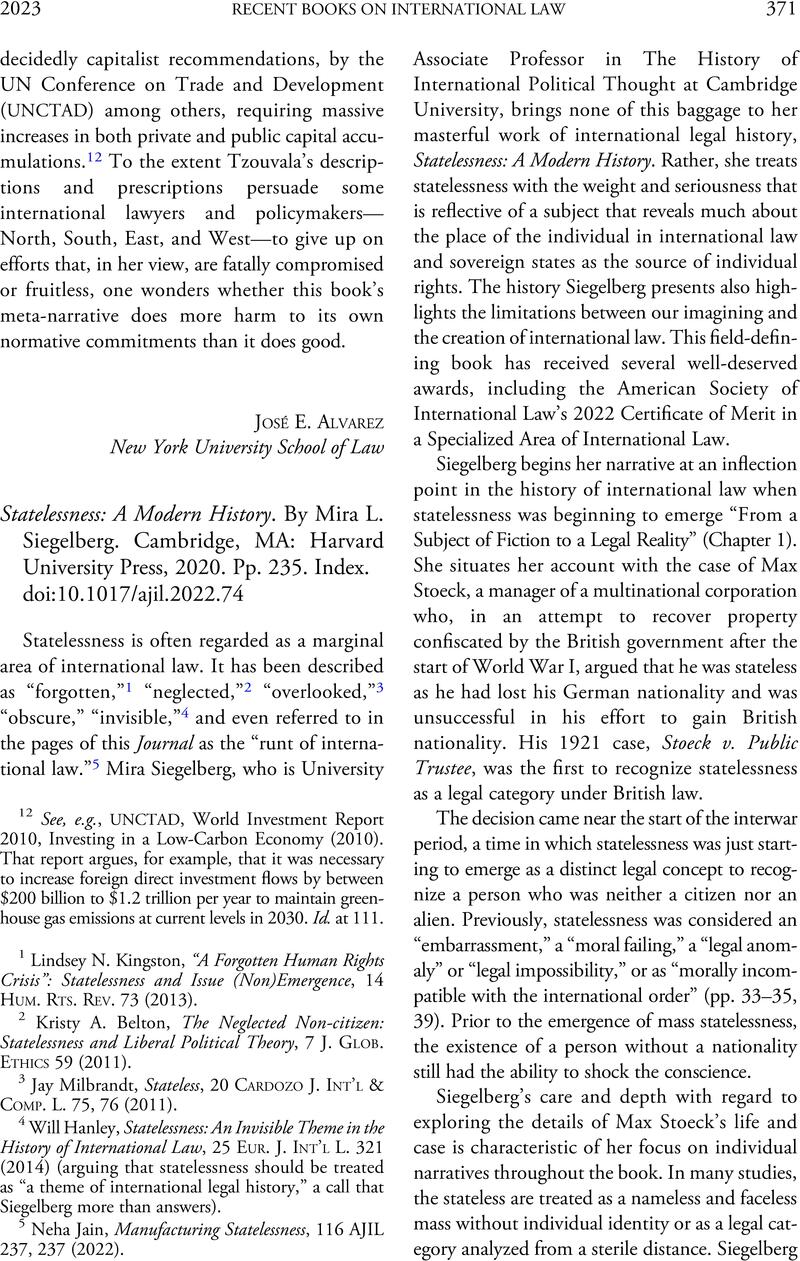No CrossRef data available.
Article contents
Statelessness: A Modern History. By Mira L. Siegelberg. Cambridge, MA: Harvard University Press, 2020. Pp. 235. Index.
Review products
Published online by Cambridge University Press: 13 April 2023
Abstract

- Type
- Book Reviews
- Information
- Copyright
- Copyright © The Author(s), 2023. Published by Cambridge University Press for The American Society of International Law
References
1 Kingston, Lindsey N., “A Forgotten Human Rights Crisis”: Statelessness and Issue (Non)Emergence, 14 Hum. Rts. Rev. 73 (2013)Google Scholar.
2 Belton, Kristy A., The Neglected Non-citizen: Statelessness and Liberal Political Theory, 7 J. Glob. Ethics 59 (2011)CrossRefGoogle Scholar.
3 Milbrandt, Jay, Stateless, 20 Cardozo J. Int'l & Comp. L. 75, 76 (2011)Google Scholar.
4 Hanley, Will, Statelessness: An Invisible Theme in the History of International Law, 25 Eur. J. Int'l L. 321 (2014)CrossRefGoogle Scholar (arguing that statelessness should be treated as “a theme of international legal history,” a call that Siegelberg more than answers).
5 Jain, Neha, Manufacturing Statelessness, 116 AJIL 237, 237 (2022)CrossRefGoogle Scholar.
6 See generally Mary Ann Glendon, A World Made New: Eleanor Roosevelt and the Universal Declaration of Human Rights (2001).
7 Stewart, Melissa, “A New Law on Earth,” Hannah Arendt and the Vision for a Positive Legal Framework to Guarantee the Right to Have Rights, 62 Va. J. Int'l L. 115 (2021)Google Scholar.
8 Hannah Arendt, The Origins of Totalitarianism 464 (1976); see also, Klabbers, Jan, Possible Islands of Predictability: The Legal Thought of Hannah Arendt, 20 Leiden J. Int'l L. 1, 11 (2007)CrossRefGoogle Scholar (arguing that this phrase signifies Arendt's “insistence that the only law valid among humans, without denying the possible existence of natural law, would be positive law”).
9 Arendt, supra note 8, at 280–81.
10 Stewart, supra note 7, at 132 (analyzing Arendt's claim that the failure to guarantee rights through law undermined human rights, as she stated “[w]hen the Rights of Man became the object of an especially inefficient charity organization, the concept of human rights naturally was discredited a little more”) (internal citations omitted).
11 Anne Orford, International Law and the Politics of History 81–83 (2021) (outlining the “basic rules of historical methodology,” which she claims includes a “prohibition against presentism” or “the tendency to interpret the past in terms of present interests, values, or concepts.” Whereas international lawyers are criticized by historians for a tendency to look at history in order to understand the present.). See also Samuel Moyn, International Law and the Politics of History, 116 AJIL 895 (2022) (arguing that Orford exaggerates the “clashes of ideology” between historians and lawyers engaged in legal history, and that historians do not reject presentism or view history as apolitically as Orford suggests).
12 Dr Mira Siegelberg, Faculty of History University of Cambridge, at https://www.hist.cam.ac.uk/people/dr-mira-siegelberg.
13 Other histories of this period include: Michelle Foster & Hélène Lambert, International Refugee Law and the Protection of Stateless Persons 27–49 (2019). Notably, the travaux préparatoires of the 1954 Convention Relating to the Status of Stateless Persons was not comprehensively compiled and available for review until this year. Betsy L. Fisher, The Travaux Préparatoires of the 1954 Convention Relating to the Status of Stateless Persons (2022), available at https://ssrn.com/abstract=4037774.
14 See, e.g., Laura van Waas, Nationality Matters: Statelessness Under International Law 151–92 (2008) (highlighting the “new” causes of statelessness, such as deficient birth or marriage registration in civil registration systems, irregular migration, and human trafficking).
15 Numbers that are still woefully lacking.
16 UN High Commissioner for Refugees, UN Conventions on Statelessness, at https://www.unhcr.org/en-us/un-conventions-on-statelessness.html.
17 International Covenant on Civil and Political Rights, Art. 24(3), Dec. 16, 1966, 999 UNTS 171; Convention on the Rights of the Child, Art. 7(1), Nov. 20, 1989, 1577 UNTS 3.
18 Convention on the Elimination of All Forms of Discrimination Against Women, Art. 9, Dec. 18, 1979, 1249 UNTS 13; International Convention on the Elimination of All Forms of Racial Discrimination, Art. 5(d)(iii), Dec. 21, 1965, 660 UNTS 195.
19 While many consider the Universal Declaration of Human Rights to be reflective of customary international law, an unqualified right to a nationality has not be codified in any human rights convention.
20 Arendt, supra note 8, at 288.
21 Draft Convention on the Elimination of Future Statelessness, at https://legal.un.org/ilc/texts/instruments/english/draft_articles/6_1_1954_1.pdf
22 A recent example is the Report of the UNICEF Office of Global Insight and Policy, Guiding Principles for Children on the Move in the Context of Climate Change, at https://www.unicef.org/globalinsight/reports/guiding-principles, which takes a “rights-based approach,” but is non-binding.
23 For example, the Global Compact for Refugees and the Global Compact for Migration are non-binding frameworks. UN Refugees and Migrants, Global Compact for Migration, at https://refugeesmigrants.un.org/migration-compact.
24 Application of the Convention on the Prevention and Punishment of the Crime of Genocide (Gam. v. Myan.), Order of 23 January 2020 on the Request for Provisional Measures, 2020 ICJ Rep. 56 (Jan. 23) (recognizing the stateless Rohingya as a “protected group” under the Genocide Convention).
25 See Stewart, Melissa, Cascading Consequences of Sinking States, 53 Stan. J. Int'l L. (forthcoming 2023)Google Scholar.




